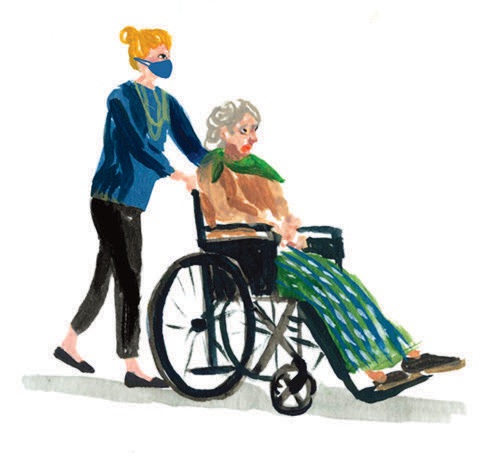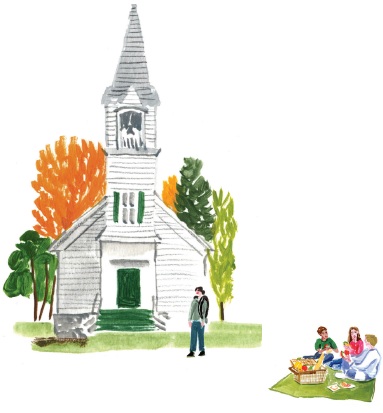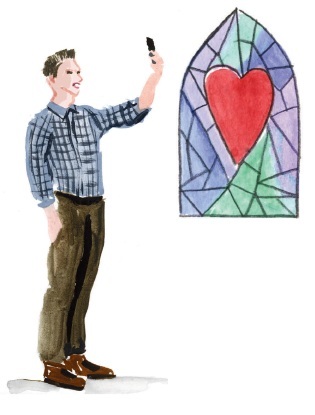
Isabella Cheplick, a master of divinity student at Pittsburgh Theological Seminary, is currently a student chaplain at two senior care facilities but has never been inside either building. Both facilities have been on lockdown throughout the pandemic, so when it’s time to get to work, she logs on to Microsoft Teams. And when it’s time to visit with residents, her supervisor, Gaea Thompson, places an open laptop and some communion elements on a cart and wheels it around with Cheplick on the screen. When a visit is finished, she texts Thompson to retrieve her and wheel her to the next resident. “I’m a head on a rolling cart,” Cheplick says.
Field education is an integral part of theological education. Students need practical experience outside the classroom to engage in ministry, develop skills, discern callings, learn from professionals, and get feedback from their supervisors and peers. Therefore, finding ways to for students to continue to do the important work of field education is essential. On the following pages are 10 ways that field education is getting done.
10 WAYS FIELD EDUCATION HAS CHANGED DURING THE PANDEMIC

1. A Different Playing Field
DENNIS SAAVEDRA CARQUIN-HAMICHAND, a second-year M.Div. student at Iliff School of Theology in Denver, is interning at St. Stephen’s Episcopal Church in nearby Aurora. He attends church in person on Sundays to participate in worship, meet with the youth group, and work with the children’s program. He also meets with his supervisor in person. But he does all the planning, outreach, and prep for his internship at home. “It’s definitely different than I expected,” he says.
While field education as it is being carried out during the pandemic is significantly different from before, the field had been changing for a few years, primarily because students’ contexts have been changing, says Kristina I. Lizardy-Hajbi, director of the Office of Professional Formation at Iliff. For example, more attention is being given to ministry preparation in nonparish settings and in online-only or hybrid contexts. Iliff students have been interning at online ministry startups, nonprofits, arts organizations, pub theology communities, Black womanist and Latina feminist organizations, and LGBTQ-based faith initiatives. Lizardy-Hajbi acknowledges that Iliff has pushed the boundaries regarding field education site placements, but she says the pandemic is causing field educators “to provide greater options for remote and virtual internships more quickly and this will likely result in expanded placement options both geographically and organizationally.”
That’s the case for students at Yale Divinity School. All internships went remote over the summer, and most are now a blend of in person and remote. While most students do their field education work locally, working remotely opens up the world beyond the local community. For example, Jennifer S. Davis, director of supervised ministries at Yale, reports that a student in Connecticut interned at a church in California, and a student in Austria interned at a church in Florida.

2. No Going Back
“MY STUDENTS ENTERED seminary thinking of church leadership in a certain way, but they will graduate into a very different church world, a very different nonprofit landscape,” says Joyce del Rosario, who directs the Community Engaged Learning program at Pacific School of Religion in Berkeley, California. “We need to teach toward that new world because there will be no going back to normal — even once the pandemic has lifted.” Bonnie Abadie, director of theological field education at Oblate School of Theology, points out that some of the site supervisors on whom she has depended for years have now been furloughed or have chosen to retire. This requires finding and mentoring new site supervisors, something the school is now focusing on. Additionally, some site placements where students have long served as interns are currently on hold, such as prisons and Catholic schools.

3. Everything Takes Longer
3 TYPICALLY, INTERNSHIPS ARE ABOUT 10 to 20 hours per week, but now certain things are taking much more time, both for students and for field educators. For example, it is taking longer for students to get to know their field placement sites. When you’re remote, “you can’t meet someone in the hallway or strike up a conversation during coffee time,” says Davis. For field educators, being online is more time consuming than being in the classroom, says James W. Barber Jr., director of the field education program at the Graduate School of Theology and Missions at Oral Roberts University (ORU). Even though a large part of its field education program has been online for more than a decade, he reports that it took some time to figure out how to move in-person lectures online. “I spend more time tweaking things, making sure it’s right, asking IT for help,” Barber says. He also notes that it is “a challenge making sure students are present, not just logged in.”
4. Essential Workers
EVEN IF THE FOCUS is more on “being” than “doing,” field education students are still doing a lot. While last spring, many interns helped to discover to new ways of doing ministry, many have done more than help; they have become significant partners in the process of change, says Barbara Blodgett, associate dean for academic programs and assessment at Pittsburgh Theological Seminary.
Carquin-Hamichand, the Iliff student, has been assigned to head up the parish’s Christmas program. Under normal circumstances, this job would come with a well-mapped-out plan from previous years, but now, he is charting an entirely new course. “We need to come up with creative ways to bring that same level of attendance and engagement even though it will be virtual this year,” he says.
At ORU, two of Barber’s students are interning at a Veterans Affairs hospital. Despite the safety concerns of working in a health care facility during a pandemic, they have continued to minister in person and have taken on greater responsibilities. “Students are very much needed,” Barber says, adding they also work on call.

5. Rethinking Ultimate Purposes
STUDENTS ARE LEARNING TO STEP BACK and look at what ministry really is and why they do it, says Blodgett, who also chairs the steering committee at the Association for Theological Field Education (AFTE).
Students are asking questions “that field educators have always hoped they would ask,” Blodgett says. For instance, instead of starting an internship to learn how to preach effectively, she says, “students are discovering that asking ‘how’ is less relevant because the method has changed. Now they are learning to ask, ‘What is preaching for in the first place?’”
Staci Plonsky, an M.Div. student at Iliff, is an intern at Suntree United Methodist Church in Melbourne, Florida. One of her assignments was to run a book study. While the group started in a hybrid format, they quickly shifted to all online. “One of the most challenging parts of being an intern right now is not learning how to lead a book study, but simply learning how to connect with people — many of whom I’ve never met in person,” Plonsky says.
And some students are wrestling with emotionally charged questions, too, says Abadie at Oblate. “Many have been exploring the question, ‘How can I be an effective minister when everything I cherish about ministry has changed?’” Doing field education in this context “helps students reflect on the difference between a ‘human doing’ and a ‘human being.’ It’s an opportunity for students to become more and do less.”

6. The Value of Technology
RELIANCE ON TECHNOLOGY has skyrocketed for those engaged in field education, just like it has for everyone else.
“The technology has been so good for us as a faith community,” says Iliff student Plonsky. “We want to be with people — and people are online.” By offering online worship and other groups on Zoom, Plonsky says they’ve “increased accessibility exponentially for people who are traveling, disabled, or struggling with mental health issues.” She acknowledges, however, that “Zoom just doesn’t have the same impact” as being in person.
Over the summer, Yale Divinity School held seminars for field education students that addressed digital ethics, boundaries to pay attention to, and what it means to have an online presence or brand. Other schools worked through potential issues with HIPAA regulations. “We had to be careful about what videography means in a health care setting, and how to care well for the privacy of this kind of congregation,” says Cheplick, the student at Pittsburgh.
7. New Standards
PERHAPS BECAUSE THEY’VE PERSONALLY witnessed how the pandemic has damaged field education programs, some students, site supervisors, and field educators have modified their approach to work. Some are responding with gentleness and patience. “In this time specifically, we need to extend much more grace to the people we work with, and we need to have more compassion,” Carquin-Hamichand says. “We can’t expect perfectionism or the efficiency that we’re accustomed to.”

8. Flexibility and Creativity
THE PANDEMIC HAS INSTIGATED extreme on-the-fly adjustments, even more than seminaries are used to. “It has invited us to become more creative and flexible in what ministry looks like,” says Cheplick, the Pittsburgh student. “All of this has been trial and error. It’s been really refreshing to be in an academic community and reflect on what has fallen flat and what has really worked.”
Research conducted by a group of field educators shows that students have gained greater adaptability and flexibility skills during the pandemic. (Their findings will be published in 2021 in an open-access journal, Reflective Practice: Formation and Supervision in Ministry.) “Because ministry and leadership cannot be engaged in the ways it was done previously, both site supervisors and students are navigating how to exist in a new normal that is anything but normal,” Iliff ’s Lizardy-Hajbi says. “These challenges have not been easy, but their responses to these challenges — and their reflections on their responses — have resulted in critical insights and growth.”
“WE GET TO ENVISION AND PARTICIPATE IN THE FORMATION OF THE BELOVED COMMUNITY IN VERY REAL AND VERY URGENT WAYS RIGHT NOW.” — Joyce del Rosario, Pacific School of Religion
9. New Methods, Same Desires
EVEN THOUGH TRENDS point to more students branching out into different types of ministries, field educators say the pandemic has not impacted the types of internships students want. If they were hoping to serve and learn in a church congregation before the pandemic, for instance, they didn’t suddenly change their mind and opt for something different.
The fundamental goals of field education also remain the same. “I just want to see that students are getting observation time, that they are participating in some way, and that they are reflecting on it with their colleagues,” says Barber, the field education director at ORU, who is pleased with the results. “Students keep finding ways to do their jobs.”
There’s one other important constant: None of the learning and discoveries that field education students make “just happen,” says Blodgett, the associate dean at Pittsburgh. Field educators know that the experience matters, but even more important is that students reflect on the experience. “Good reflection on experiences takes planning and leading,” she says. “It’s because someone asked students to reflect that they reflected and learned in the first place. Someone is bringing students together with their peers and facilitating weekly discussions. Someone is training the student-supervisor pairs to do a weekly theological reflection. Someone is training these trainers. Learning from experience takes staffing and funding, in other words.”

10. Hopeful Results
JAMES BARBER SEES A GREAT DEMAND for well-trained students with solid field education experience. “Chaplaincy experience practically guarantees a job,” he says. Chaplains are being hired by hospitals, nursing homes, and the military. Parachurch ministries, missions, and charitable organizations need workers, and counselors too are in demand.
Joyce del Rosario at Pacific School of Religion is also optimistic about the opportunities for students and field educators. “We get to envision and participate in the formation of the beloved community in very real and very urgent ways right now,” she says.
Bonnie Abadie at Oblate shares the same sentiment: “This is a blessing to see God in the brokenness of a pandemic and share that vision with others.”
And Isabella Cheplick, the virtual head on a rolling cart, has hope, too. “I’m learning more than I ever thought I would,” she says. “I don’t know how much to attribute to doing field ed during this pandemic, but God is always at work in the world — maybe especially now — despite your own limitations or the limitations that the world in its chaos has placed on you.”
Illustrations by Cassandre Montoriol